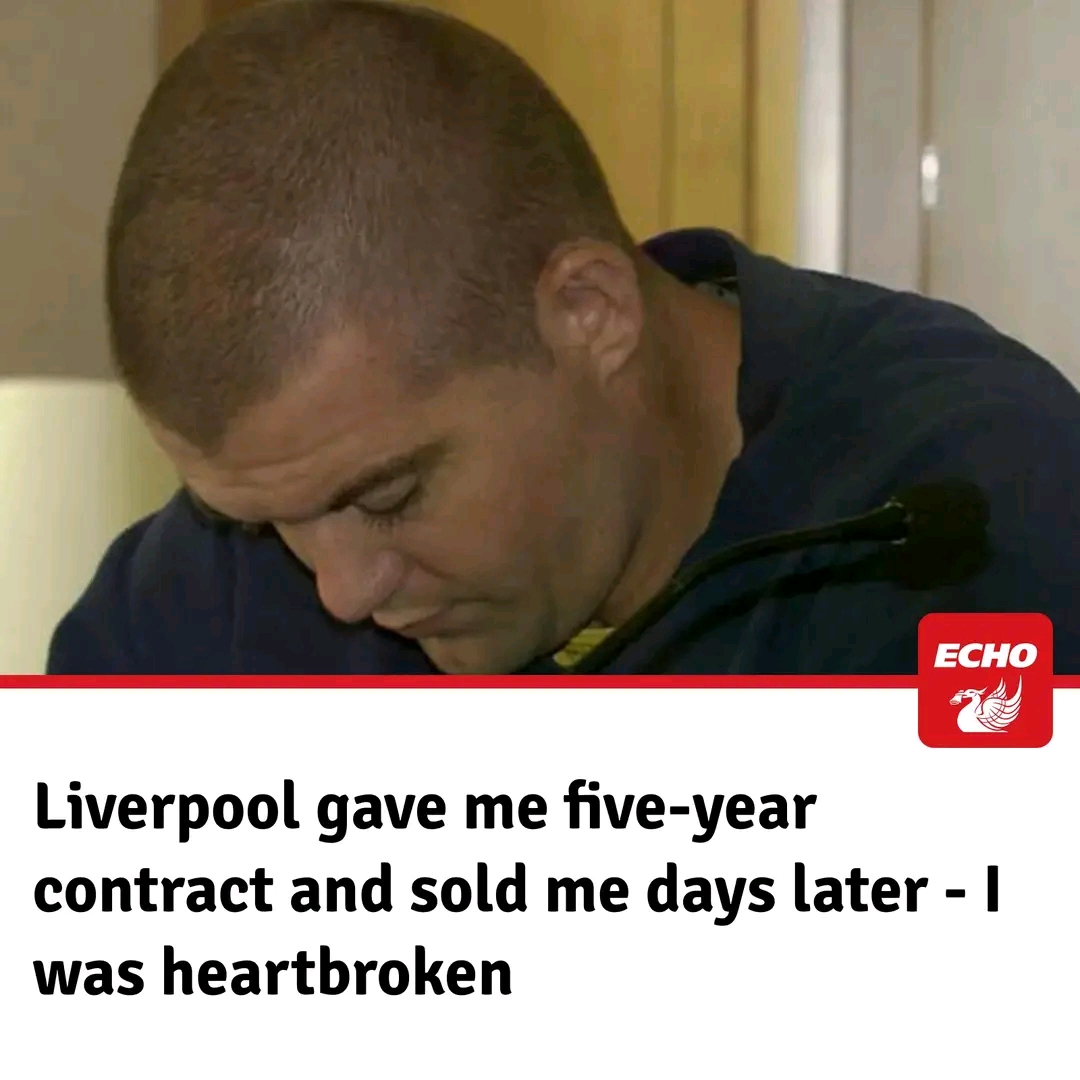Liverpool gave me five-year contract and sold me days later – I was heartbroken

Liverpool fans have seen many stars come and go, players who have risen through the youth ranks, who have worn the red shirt with pride, but few stories hit as hard as the one Dominic Matteo tells. To imagine a player signing a long-term contract, celebrating a new chapter of stability and commitment, only to find himself shipped out just days later, is something that seems almost unreal in the modern game, but this is exactly what happened to Matteo, a young Scottish talent whose journey at Liverpool could have been glittered with trophies, adoration, and years of legacy, yet instead took a turn that would leave him heartbroken and searching for a new path.
The summer of 2000 was a moment of triumph and confusion, joy and despair, a moment in Matteo’s life that he would recount years later with honesty and emotion, a story that has echoes for Liverpool today as new players face similar crossroads, as new contracts and promises clash with ambition, opportunity, and the sometimes cruel nature of football. Matteo had been at Liverpool for years, working his way up, training, learning, pushing himself to make every day count, every session on the Anfield pitch a chance to prove that he deserved a place in the first team, that he could be more than just a squad member, that he could be a starter, a key player, someone who mattered.
And in 2000, his efforts were recognized. The club offered him a five-year contract, a deal that, by the standards of the day, was more than generous, a statement of belief in him, a pledge that Liverpool saw him as part of their future. Signing that contract was meant to be a moment of celebration, a moment of certainty in a career filled with the unpredictability of football. Yet within four days, everything changed, and Matteo found himself leaving the club he loved, leaving Anfield behind, not because of a lack of ability, not because of failure, but because football is sometimes a game of timing, opportunity, and decisions that can leave even the most loyal and hardworking players in shock. “On the Monday, I was signing a five-year deal that, by the standards of the day, was a lucrative one.
But, just four days later, I was on my way out of Liverpool,” Matteo revealed years later in his autobiography, ‘In My Defence’. The words capture the disbelief, the suddenness, the almost surreal nature of the moment. He was in shock, asking himself how things could change so quickly, how a future that seemed secure could be swept away in days. For Matteo, it was not just a professional shift; it was deeply personal. Liverpool had been his home, the club where he had grown as a player, where he had poured his energy, passion, and talent into every match, every training session. To leave was upsetting, painful even, but Matteo understood that for the sake of his career, he needed a fresh start. He needed games, opportunities to play, to show the world what he could do.
Staying at Liverpool risked stagnation, the painful reality of sitting on the bench while others took the spotlight. And so, reluctantly, he left, missing out on the glories that Liverpool would go on to achieve in the following season, trophies that he could have been part of lifting, moments that would be celebrated by his former teammates, while he looked on from afar. In the 1999/2000 season, Matteo had enjoyed his most successful campaign yet, starting 32 times in the Premier League, recording six assists, proving his quality, showing that he could compete at the highest level.
Yet despite this, Liverpool manager Gerard Houllier pursued Christian Ziege from Middlesbrough, a decision that would prove to be Matteo’s undoing at Anfield, despite the club’s faith in him and his recent contract extension. The reality of football is harsh. Talent alone does not always guarantee longevity at a club. Opportunity, timing, and managerial decisions often weigh just as heavily, and for Matteo, these factors combined in a way that forced him to make a choice he never wanted to make. In an exclusive interview years later, Matteo admitted the heartbreak of leaving Liverpool, the weight of the decision, and the emotional turmoil that came with it. He knew Houllier had faith in him, believed he could play ahead of Ziege, and yet the certainty of regular football was not guaranteed. “When I left Liverpool, I had five years left on my contract. I didn’t think I was going anywhere, but I didn’t think I was going to get the game time again. The reason why I left was because of that. There was no other reason. I wanted to stay, but I wasn’t going to get the game time. I thought I couldn’t have another three or four years of not playing.
It just wasn’t what I wanted,” Matteo said, capturing the complex mix of loyalty and pragmatism, the tension between staying for love of the club and leaving for the love of football itself. Houllier had to make decisions, and Matteo respected that. He understood the pressures of managing a club, of balancing squad depth, star acquisitions, and player ambitions. Matteo was confident in his ability, in his right to play, in his versatility, his capacity to perform in multiple positions, yet even this was not enough to secure his future at Liverpool when Ziege arrived. “I generally thought I would play ahead of Ziege in my own head, because you got to have that confidence about yourself.
I wasn’t being cocky, I just thought I could match that. And I could play numerous positions as well, which I always thought was a help,” Matteo explained, reflecting the mindset of a young professional, ambitious yet grounded, aware of his strengths, but also aware of the realities he faced. The season before, he had been one of the best players, rarely missing games, contributing meaningfully to Liverpool’s campaigns, yet even performance is sometimes secondary to managerial strategy and club ambitions. Liverpool narrowly missed out on the Champions League that year, losing to Bradford, a result that still stings in Matteo’s memory, moments that make him wonder what might have been. If results had been different, perhaps he would have stayed. Perhaps he would have lifted trophies with the team, celebrated with the fans, his story intertwined with the Reds’ success. Instead, he was forced to move on. Going to Leeds United was a fresh start, a chance to play in the Champions League, to continue his career at a high level, yet it came with mixed emotions, knowing that Liverpool would go on to win the UEFA Cup that year. He missed out on silverware, on celebrations, on moments every footballer dreams of.
The experience of leaving, of watching others succeed while he played elsewhere, left Matteo with feelings that lingered, emotions that are common in football but seldom discussed openly. He would always look back at that summer with a mixture of pride for his achievements and a pang of regret for what he left behind. Ziege, the player who replaced him, ultimately flopped at Anfield, moving on after a single season, while Matteo became a fan favorite at Leeds, establishing himself as a player who could make a difference, who could influence matches, who could lead on the pitch.
His former teammate, Didi Hamann, even urged him to stay, believing in Matteo’s quality, believing that he could outperform Ziege, yet seven years in Liverpool’s first team without being first choice for the majority of that time had already taught Matteo the value of regular football. He had fought for his place, worked tirelessly, and understood that sometimes, to grow, one must move on. “I wanted to play. I knew I was playing well. I knew I was hitting things at the right moment. Things were working for me training-wise and everything was going in the right direction. But obviously when you’re a club like Liverpool and the big hitters come in for someone, you always know, and I had a lot of that,” Matteo reflected, showing the constant struggle players face when competing at elite clubs, where youth must battle experience, and talent must compete with strategic acquisitions. When Matteo joined Liverpool as a young player, he was surrounded by experienced defenders like John Scales, Phil Babb, and Mark Wright. All great players, all with impressive careers, all ahead of him in the pecking order.
Yet Matteo’s drive and belief in himself pushed him forward, nurturing confidence while recognizing the challenges. “But I’m thinking, ‘When am I going to get my chance to play my actual position?’ So it was a lot of things in my mind going around thinking I want to play more. At that point I was playing very well. I was playing well. Didi was my mate, he was trying to support me even though he’s German as well as Ziege, but I think he knew there was a place for me whether it would have been at full-back or centre-back. I think he was just wanting to keep me around because he knew that the improvement in me over the last few years, I knew it was better. And it was all down to playing regularly and staying away from injuries. That’s key. But regular football, when you’re at a club like Liverpool, it’s hard. Unless you’re the superstar like Fowler or Michael Owen, they’re always going to play. But when you are another young lad coming through who hasn’t quite got the pedigree that they’ve got, it’s always going to be a battle to get into the first team. And there’s only so long you can do that for before you have to make a choice. And I suppose that’s what happened, I had to make a choice. And it was to go to Leeds United,
Matteo recounted, showing the reality for many young players: the constant tension between patience, opportunity, and the desire to play. His transfer to Leeds was not without obstacles. Matteo failed his medical due to a minor knee injury, yet the club assured him that his £4.75 million move would proceed. He had come through Liverpool’s youth ranks, his career at Anfield concluded, and a new chapter awaited him across the Pennines. “David (O’Leary) and Peter (Ridsdale) said to me, ‘We’re signing you on a long contract. So whatever this scenario is, we want you anyway’,” Matteo remembered, a reassurance that even amidst injury doubts, his talent and potential were recognized. The injury, a small tear in his knee, was not severe, and he played his final game for Liverpool against Parma at Anfield, a 5-0 victory. That day marked the end of one era and the beginning of another, a bittersweet moment, full of emotion and reflection. Matteo’s story is not just about contracts and transfers, it is about ambition, heartbreak, and resilience. It is about
understanding that football is a career of opportunities, of timing, of decisions that can seem unfair yet define a player’s path. For Liverpool fans, it is a reminder that behind every transfer, every signing, every departure, there is a human story, filled with hopes, fears, and the relentless pursuit of playing the game they love. Matteo went on to use his experiences beyond football, speaking on behalf of EPIC Global Solutions, helping raise awareness about gambling harm in sports, sharing his journey to educate others, showing that the lessons learned on the pitch can resonate far beyond it. His tale is a testament to the complexities of football life, the emotional weight of decisions, the triumphs missed, and the resilience required to continue chasing dreams despite setbacks, a story that Liverpool fans and players alike can learn from, a narrative that echoes the past, informs the present, and resonates deeply for the future.















